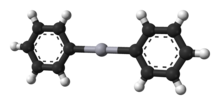Diphenylmercury

| |

| |
| Identifiers | |
|---|---|
3D model (JSmol)
|
|
| ChemSpider | |
| ECHA InfoCard | 100.008.734 |
| EC Number |
|
PubChem CID
|
|
| UNII | |
CompTox Dashboard (EPA)
|
|
| |
| |
| Properties | |
| C12H10Hg | |
| Molar mass | 354.80 g mol−1 |
| Appearance | white solid |
| Density | 2.318 g cm−3[1] |
| Melting point | 121 to 123 °C (250 to 253 °F; 394 to 396 K) |
| Boiling point | 204 °C (399 °F; 477 K)[1] |
| slightly soluble in ethanol, diethyl ether; soluble in benzene, chloroform[1] | |
Except where otherwise noted, data are given for materials in their standard state (at 25 °C [77 °F], 100 kPa). | |
| Infobox references | |
Diphenylmercury is the organomercury compound with the formula Hg(C6H5)2. It is a white solid.[2] The compound is of historic interest as a particularly stable organometallic compound but it finds few uses because of its high toxicity.
Preparation[]
Commercially available, this compound can be prepared by several routes. It results from treating phenylmercury acetate with sodium stannite,[3] by the reaction of mercuric halides with phenylmagnesium bromide,[4] and the reaction of bromobenzene with sodium amalgam.[5]
Safety[]
Diphenylmercury is highly toxic.
References[]
- ^ a b c Lide, D. R. (2008). CRC Handbook of Chemistry and Physics, 89th Edition. CRC Press. pp. 3–518. ISBN 978-0-8493-0488-0.
- ^ Glidewell, C.; Low, J. N.; Wardell, J. L. (2005). "Diphenylmercury, redetermined at 120 K: sheets built from a single C-H···π(arene) hydrogen bond" (PDF). Acta Crystallographica C. 61 (2): m107–m108. doi:10.1107/S0108270104034134. PMID 15695887.
- ^ Maynard, J. L. (1924). "The Direct Mercuration of Benzene and the Preparation of Mercury Diphenyl". Journal of the American Chemical Society. 46 (6): 1510–1512. doi:10.1021/ja01671a024.
- ^ Borgstrom, P.; Dewar, M. M. (1929). "The Preparation of Mercury Diphenyl by Use of the Grignard Reagent". Journal of the American Chemical Society. 51 (11): 3387–3389. doi:10.1021/ja01386a030.
- ^ Calvery, H. O. (1929). "Diphenylmercury". Organic Syntheses. 9: 54.; Collective Volume, 1, p. 228
Categories:
- Organomercury compounds
- Phenyl compounds